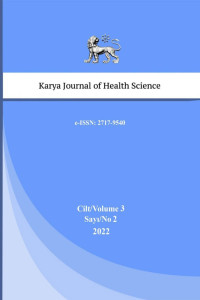Research Article
Issue Editorial Board

Akdeniz Üniversitesi Tıp Fakültesi Fizyoloji AD Temel Tıp bilimleri Yüksek Lisans ve Doktora
Muğla Sıtkı Koçman Üniversitesi Sağlık Bilimleri Fakültesi Fizyoterapi ve Rehabilitasyon
Temel İnsan Fizyolojisi
Tıbbi Fizyoloji
Egzersiz Fizyolojisi









EDITOR


Lisansını Erciyes Üniversitesi Sağlık Bilimleri Fakültesi Beslenme ve Diyetetik Bölümünden, yüksek lisansını Marmara Üniversitesi Sağlık Bilimleri Enstitüsü Halk Sağlığı Anabilim Dalından, Doktorasını Okan Üniversitesi Sağlık Bilimleri Enstitüsü Beslenme ve Diyetetik Anabilimdalı’nda tamamladıktan sonra 2020 yılında Doçentliğini almıştır. Çok iyi düzeyde İngilizceye ve orta düzeyde Fransızcaya sahiptir. İngilizce olarak yazılmış uluslararası yayınevleri tarafından basılan ‘Dietary Aprroaches To Irritable Bowel Syndrome(IBS)’ isminde kitabı mevcuttur. Ayrıca Ulusal yayınevi tarafından basılan birçok bilimsel kitaplarda bölüm yazarlığı vardır ve ayrıca editörlüğünü yaptığı bir adet ulusal yayınevi tarafından basılan çok yazarlı kitabı mevcuttur. Çok sayıda SCI, SCI-E, SSCI, AHCI ve alan indeksli ESCI tarafından taranan uluslararası yayını ve hakemli tr-dizin ve alan indeksli dergilerde yayınlanmış ulusal yayınları mevcuttur. Birçok Ulusal ve uluslarası kongre ve konferanslara konuşmacı ve katılımcı olarak katılmıştır.



Aim & Scope
Journal of Karya Health Science aims to share the high-evidence which is current and according to ethical principles in the field of health such as nutrition and dietetics, pharmacy, nursing, physiotherapy and rehabilitation, gerontology, health management, sports sciences, basic and clinical medical sciences.
Journal of Karya Health Science publishes research articles, case reports and review articles in every field of health sciences. The publication languages of the journal are Turkish and English. Manuscripts published in another journal or submitted for evaluation, or articles that are not prepared according to the journal's writing rules are not accepted for evaluation.
Licensing and Copyright terms
The journal is an open access publication and texts for all issues and content are available for free in electronic version. Access to read content does not require any registration and the content is accessible immediately after published online. Free online access users can read, download, copy, distribute, print, search, or link to the full texts of articles, crawl them for indexing, pass them as data to software, or use them for any other lawful purpose.
All copyrights of the articles accepted for publication in the Journal of Karya Health Science belong to the publisher. The publication rights agreement form of the journal should be signed by the authors and submitted in pdf format.
Author Guidelines
Author Charges
The journal doesn't have any charges to authors.
The writing rules have been updated as of May 2021.
WRITING RULES
Articles to be submitted to the journal must be original, not published elsewhere or in the process of evaluation. All responsibilities (ethical, scientific, legal, etc.) of the articles published in the journal belong to the author(s). The editor, assistant editors, and publisher do not accept any responsibility for the articles published in the journal.
ETHIC
Journal of Karya Health Science; It is based on the guidelines of the International Council of Medical Journal Editors (ICMJE) and the Commission on Publication Ethics (COPE) prepared as a guide for authors, reviewers, and editors. In research articles conducted on humans, the research was approved by the relevant Ethics Committee, the study was carried out in accordance with the Declaration of Helsinki Principles (https://www.wma.net/what-we-do/medical-ethics/declaration-of-helsinki/), It should be clearly stated in the “Methods” section that the consent of the volunteers included in the study and the permission of the institution were obtained. In the case of reports, signed consent should be obtained and it should be clearly stated in the "Case Report" section. Assuming that the studies in the articles submitted to the Karya Journal of Health Science are carried out in accordance with the Declaration of Helsinki and that institutional, ethical, and legal permissions are obtained, no responsibility will be accepted in this regard. In studies conducted on animals, the information that animal rights are protected in accordance with the principles of the Guide for the Care and Use of Laboratory Animals (www.nap.edu/catalog/5140.html) and that the research has been approved by the relevant Ethics Committee should be clearly stated in the "Methods" section.
The author(s) must ensure that the figures, pictures, photographs, charts, and other supplementary material in the article are original. If the article has been previously published, belongs to others; If quotations, tables, pictures, scales, and similar materials are used, the author(s) is obliged to obtain written permission from the copyright holder and author(s) and to indicate this in the article. Legal responsibility regarding this issue belongs to the authors. It should be noted that copyright regulations are complied with for the ideas and works of art used. If there is a commercial connection or financial support institution (directly or indirectly) for the study, the authors; It is obligatory to state on the title page that it has no commercial relationship with the commercial product, drug, company used, or what kind of relationship it has (consultant, other agreements, etc.), if any.
The article should be passed through the academic plagiarism program by the authors and a plagiarism report should be submitted. The similarity rate should not exceed 25%. According to the results of the similarity report, the article; It can be sent to the field editor for evaluation, sent back to the author with a correction request, or rejected without being evaluated (articles with a similarity rate of more than 25%).
The corresponding author is responsible for the final version of the manuscript on behalf of all authors. The scientific, ethical, and legal responsibility of the articles belongs to the author(s). (http://www.icmje.org/about-icmje/faqs/conflict-of-interest-disclosure-forms/). The author(s) are responsible for reading the "Ethical Policy and Publication Policy" content.
ARTICLE SUBMISSION
Articles are uploaded via DergiPark. All authors in the article must obtain an individual ORCID (Open Researcher and Contributor ID) number from http://orcid.org and indicate this number on the title page of the article. The corresponding author should add all authors to the DergiPark system when submitting their article.
EDITOR PREVIEW
Articles sent to the journal are evaluated in terms of writing rules, scientific value, originality, plagiarism, and ethics. Manuscripts that do not meet these criteria are rejected without being evaluated by the referee.
ARTICLE WRITING RULES
The article should be uploaded to the system with the name and surname of the responsible author. The article should be prepared in "Microsoft Word" format, double-spaced, "Times New Roman" font, 12 point size, no spaces between lines, and the line number to start over on each page. Pages should be numbered from the abstract page. A margin of 2.5 cm should be left on all sides of the page (sample article is available on the journal website).
The article should include Title Page, Turkish Abstract, English Abstract, Text (Introduction, Method, Results, Discussion, Conclusion), References, Tables and Figures sections, each starting on a separate page. "System International" (SI) units should be used in the article. Figures, tables and graphics should be referenced in the text. Abbreviations should be given in parentheses at the first occurrence of the word. In Turkish articles, X% should be written adjacent, likewise in English, X% should be adjacent. Dots (55.78) should be used in decimals.
ARTICLE TYPES
Research ArticlesThese are articles that cover all kinds of experimental and descriptive studies. The abstract (approximately 200-250 words, with sections -purpose, method, findings and conclusion-, in Turkish and English), should consist of Introduction, Method, Results, Discussion, Conclusion, Acknowledgments, References. The number of words should not exceed 3000 (excluding abstracts, bibliography and tables), the number of tables, figures, photographs and pictures should not exceed 5 in total, and the number of references should not exceed 40.
Reviews
Reviews can be prepared by invited authors or directly. Reviews in accordance with the publication policy of the journal should consist of an abstract (approximately 200-250 words, without sections, in Turkish and English), titles and References sections. The number of words should not exceed 4000 and the number of references should not exceed 60.
Case Reports
These are articles in which cases that differ in diagnosis and treatment or that are rare are combined with clinical experiences and supported by visuals such as photographs, images, figures. It should be arranged as Abstract (approximately 100-150 words; no chapters; Turkish and English), Introduction, Case report, Discussion, and Conclusion. The number of words should not exceed 1500, the number of figures, photographs and pictures should not exceed 3 in total, and the number of references should not exceed 20.
Letters to the Editor
These are the articles that contain the different opinions, experiences and questions of the readers about the articles published in the Journal of Karya Health Science in the last year. It should not contain Title and Summary sections. It should be stated to which article it is dedicated (by number, date) and the name, institution and address of the author should be included at the end. The answer to the letter is given by the editor or the author(s) of the article by publishing it in the journal. The number of words should not exceed 500 and the number of references should not exceed 5.
SECTIONS OF THE ARTICLE
Title PageThe type of the article (research, review, case report, etc.) should be specified. The title of the article should describe the study, be clear and short. Turkish and English titles should be given consecutively. Abbreviations should not be used in the title. All authors' full names and surnames should be written, numbered from 1 with a superscript, and their academic titles, institution, clinic, department, city, country, ORCID (Open Researcher and Contributor ID) no information, e-mail address should be added under the names of the authors. . All institution names should be written in Turkish or English (valid for English articles). The name, surname, current address, e-mail address, accessible phone numbers of the corresponding author (GSM phone number must be given) should also be specified. The abstract and text (excluding tables and references) word count of the article, the name of the congress, if a part or all of it has not been published elsewhere, it is not in the process of being evaluated in another journal at the same time, if it has been presented as a paper in any scientific meeting or the summary has been published, the name of the congress, place, and date provided must be specified. If any financial (in cash-in-kind) support is provided to the study, the authors should explain whether they have a relationship of interest with the institutions providing this support, what kind of relationship they have (institution/organization, type of support), and should indicate at the bottom of the title page.
Abstract
Abstract text, Turkish and English, should be prepared on separate pages.
Abstract: It should contain the headings “Amaç”, “Yöntem”, “Bulgular”, “Sonuç” and “Anahtar Kelimeler”, Abstract: “Purpose”, “Methods”, “Results”, “Conclusion” and “Keywords”. In review and case reports, the abstract should be prepared in a single paragraph without using headings. Abbreviations should be avoided in the abstract. Keywords should consist of 5 words. Keywords should be separated by commas. Turkish Keywords should be given in accordance with "Turkish Science Terms" (www.bilimterimleri.com), English Keywords should be in accordance with "Medical Subject Headings (MESH) (www.nlm.nih.gov/mesh/MBrowser.html). Turkish and English abstracts and keywords should correspond to each other.
Text
This section should consist of “Introduction, Method, Results, Discussion and Conclusion” sections. Author and institution names should not be included. All terms to be abbreviated in the text should be specified in parentheses at the first occurrence in the text. The words abbreviated in the abstract section should be written in their long form and shortened in the first place in the text. Abbreviations should be in the form of standard expressions. Figures, photographs, tables, and graphics should be mentioned at the end of the relevant sentence where they appear in the text, and should not be placed in the text.
-Introduction: It should consist of literature knowledge about the study subject, the reason and the purpose of the study.
-Method: The method used in the study should be prepared in clear and understandable detail, including how the data were collected. The statistical methods by which the data were evaluated should be given under the statistical analysis subheading.
-Results: Statistical results of the study should be given. The data should be presented as clearly as possible, clearly supported by tables, graphs or figures.
-Discussion: The conclusions drawn from the findings should be addressed; findings should be discussed and interpreted in the light of current literature. It should be noted that the literature to be used is directly related to the findings of the authors. Statistical results used in the findings should not be repeated in this section. At the end of the discussion section, the limitations of the study, if any, should be stated under the "Limitations" subheading.
-Conclusion: The contribution of the results obtained from the study to the field and/or the clinical message should be given in a clear language, in one paragraph.
-Acknowledgements: If there is a person and/or organization that supported the study, a brief thank you should be given.
References
References should be numbered in order of passage, starting from the text of the article. References should be cited at the end of the sentence, just before the period, in Arabic numerals, using square brackets. When citing the author's name in the text, the first author's surname and “ark.” in Turkish articles, the surname of the first author, and “et al.” in English articles. should be accompanied by the abbreviation. For multiple and consecutive citations; The notation as [10-15] should be used. A comma should be placed between the references, and no spaces should be left before and after the comma.
If the number of article authors is 6 or less, all authors should be written. For articles with more than 6 authors, the first 3 authors should be written and "et al." abbreviation should be used. Journal abbreviations used for reference writing should follow the style used in Cumulated Index Medicus (www.icmje.org). In the reference list, only works that have been published or accepted for publication or that have a doi number should be included. Citation of unpublished observations and personal interviews should be avoided. If the books are very necessary, the source should be cited and limited to 2-3 books at most. The author(s) are responsible for the accuracy of the references. Importance should be given to the synthesis of domestic and foreign references. In a Vancouver-style reference, the name(s) of the Author(s), - Title of the article, - Journal name (abbreviated according to Cumulated Index Medicus), - Year of publication, - Journal volume and number, - Pages must be given.
References ExamplesJournal
Sonmezdag AS, Kesen S, Amanpour A, et al. LC-DAD-ESI-MS/MS and GC-MS profiling of phenolic and aroma compounds of sunflower oil during deep-fat frying. J Food Process Pres. 2019;43:1-9.
Journal Supplement
Braxton E, Wohlfeld BJ, Blumenthal S. Postoperative care pathways following lumbar total disc replacement. Spine. 2019;24(S):1-12.
Online Journal Article
If a Digital Object Identifier (DOI) number is assigned for online published articles awaiting publication, the DOI number is appended to the end:
Book
Book Chapter
Marrero DG. Diabetes Mellitus. In: Flanagan SN, Zaretsky H, Moroz A, eds. Medical aspects of disability: A Handbook for the rehabilitation professional. 4th ed. New York: Springer Publishing Company; 2011:159-176.
Tables, Figures, Graphics and Images
All tables, figures, graphics and images should be prepared on separate pages and added after the references. All figures, graphics and images used in the text should be named as “Figure” and tables should be named as “Tables”. All figures and tables used should be mentioned in the text. Each of them should be numbered according to the order of occurrence in the text and a short title should be written. The titles of the tables should be written clearly above the table, and the titles of the figures should be written below the figure. Abbreviations used in the tables should be explained under the table. If another publication is cited, the print permission must be sent together. Figures should be prepared with 'jpeg' compression technique and each shape should be saved in a separate file. Figures must be at least 9×13 cm in size and 300 dpi resolution.
Ethical Principles and Publication Policy
Journal of Karya Health Science; It is based on the guidelines of the International Council of Medical Journal Editors (ICMJE) and the Commission on Publication Ethics (COPE) prepared as a guide for authors, reviewers and editors.
All stakeholders who present a scientific study are expected to contribute to the impartial and correct progress of science. Compliance with scientific ethical principles is extremely important in all scientific studies prepared for this purpose. The principles that should be adopted by all stakeholders are presented below.
Editors' Ethical Responsibilities
1. To work for the continuous development and improvement of the publication quality of the journal,
2. To determine the publication policy of the journal and to ensure its implementation,
3. To make a preliminary evaluation of the articles sent for publication in terms of writing rules, scientific value, originality, plagiarism and ethics,
4. To reject the articles that are not suitable for the purpose and scope of the journal,
5. To ensure that the articles submitted for publication are evaluated by the appropriate field editors,
6. To take precautions regarding unethical behavior,
7. To apply the necessary procedures in accordance with the publication policy of the journal in case of a complaint in the nature of an ethical violation.
Ethical Responsibilities of Field Editors
1. Accepting articles related to his/her field of expertise for evaluation,
2. To guarantee that the referee evaluations are made objectively, impartially and on time,
3. To ensure that the article sent for publication is evaluated by two referees from different institutions, with double-blind refereeing,
4. To complete the entire evaluation process of the article sent for publication,
5. To reject the article by making the necessary explanations, if any conflict of interest is detected in the article sent for publication,
6. To take precautions regarding the situations that will delay the publication of the article.
Ethical Responsibilities of Reviewers
1. Accepting articles related to his/her field of expertise for evaluation,
2. Notifying the field editor if there is a situation contrary to blind refereeing and not evaluating the work,
4. To keep the information about the article that he accepted for evaluation confidential,
5. To evaluate the article with the principle of impartiality and confidentiality,
6. To complete the article evaluation objectively and without any self-interest,
7. Not wanting their own articles to be cited unless there is a strong scientific justification,
8. To state their suggestions regarding the article in the Peer Review Form in academic writing, constructively and in detail,
9. Completing the article evaluation on time,
10. To destroy all files related to the article it has evaluated after examining it.
Ethical Responsibilities of Authors
1. To guarantee the originality of the article they sent for publication,
2. Not to include the article they sent for publication in the application process of more than one journal at the same time,
3. To guarantee that the work they sent for publication has not been published elsewhere before,
4. To comply with the copyright regulations for the intellectual and artistic works used,
5. Not to allow unfair authorship in the article they sent for publication,
6. To explain situations and relationships that may constitute a conflict of interest in the article they sent for publication,
7. In the article they sent for publication, the study was approved by the relevant Ethics Committee, the study was carried out in accordance with the Declaration of Helsinki Principles https://www.wma.net/what-we-do/medical-ethics/declaration-of-helsinki/), to ensure that the consent of the included volunteers and institutional permissions are obtained and to explain it in the method section of the article,
8. To have signed informed consent in case reports and to explain in the method section of the article,
9. To ensure that animal rights are protected in accordance with the principles of the Guide for the Care and Use of Laboratory Animals (www.nap.edu/catalog/5140.html) in research conducted on animals, that the research is approved by the relevant Ethics Committee, that institutional permissions are obtained, and that the method of the article explains in the section.
10. To cite correctly and in accordance with the spelling rules in the article they sent for publication and to include them completely in the references section,
11. If the article they sent for publication includes previously published materials such as excerpts, tables, figures, surveys, and scales, obtaining written permission from the copyright holder and authors and stating this in the article,
12. If information or raw data is requested regarding the article they sent for publication during the evaluation process; be ready to present the requested information and data to the editorial board,
13. To meet the corrections of the article they sent for publication,
14. Not making requests such as changing the author order, removing an author, adding an author in the article is accepted for publication or published,
15. Informing the editors of the journal in case of noticing a mistake or error in the published, early appearance or evaluation stage, and cooperating with the editor in correction or withdrawal processes
16. In case of any conflict of interest and/or ethical violation regarding the article, it is to share it with the editor and publisher, to publish an error statement, addendum, compensation notice, and to withdraw the work when deemed necessary.
PUBLICATION POLICY
PUBLICATION EVALUATION PROCESS
Every article submitted to the Journal of Karya Health Science is first evaluated by the editors in terms of compliance with the writing and publication principles. The appropriate articles are sent to the field editors. Manuscripts that are not suitable will be rejected. Field editors send the manuscripts to two independent referees who are experts in their fields. The names of the referees and authors are kept confidential from each other. The time period for the referees to notify whether they will evaluate the manuscript sent to them is 5 days. The evaluation period of the referees who accept to evaluate the manuscript is 15 days. This process is followed and executed by the field editors. If the refereeing is not accepted, the field editors appoint a new referee for the article. The article, which receives two positive referee reports from the field evaluation, is accepted for publication after being reviewed for the last time by the editors, and the number to be published is decided. The article, which receives a positive and negative referee report, is sent to a third referee and the publication or not is determined in accordance with the report of the third referee. The correction period requested from the authors is 15 days. Authors are required to make the desired corrections on time and upload them to the system via DergiPark. The publication review process is concluded within 2-3 months on average. All transactions are carried out electronically. No fee is charged for the evaluation and publication of the articles. No fee is paid to the authors for the articles published in the journal. If the article is in the preflight step, it can be withdrawn by the responsible author. If the article is under evaluation or publication, it cannot be withdrawn. After the article is published, the authors have an obligation to cooperate with the journal editor in the withdrawal process. The author(s) who want to make a withdrawal request are obliged to send the article name, reasons for the withdrawal, and a petition signed with the wet signature of each author to the Editor-in-Chief of the Journal via e-mail at kilichanbayar@gmail.com. The Editorial Board reviews the withdrawal notification and returns within 15 days at the latest.
COPYRIGHT
All copyrights of the articles accepted for publication in the Journal of Karya Health Science belong to the publisher according to the 1976 Copyright Law. The publication rights agreement form of the journal should be signed by the authors and submitted in pdf format.
Price Policy
No fee is charged for the evaluation and publication of the articles.
This material is licensed by Creative Commons Attribution-NonCommercial-No Derivative 4.0 International License.

